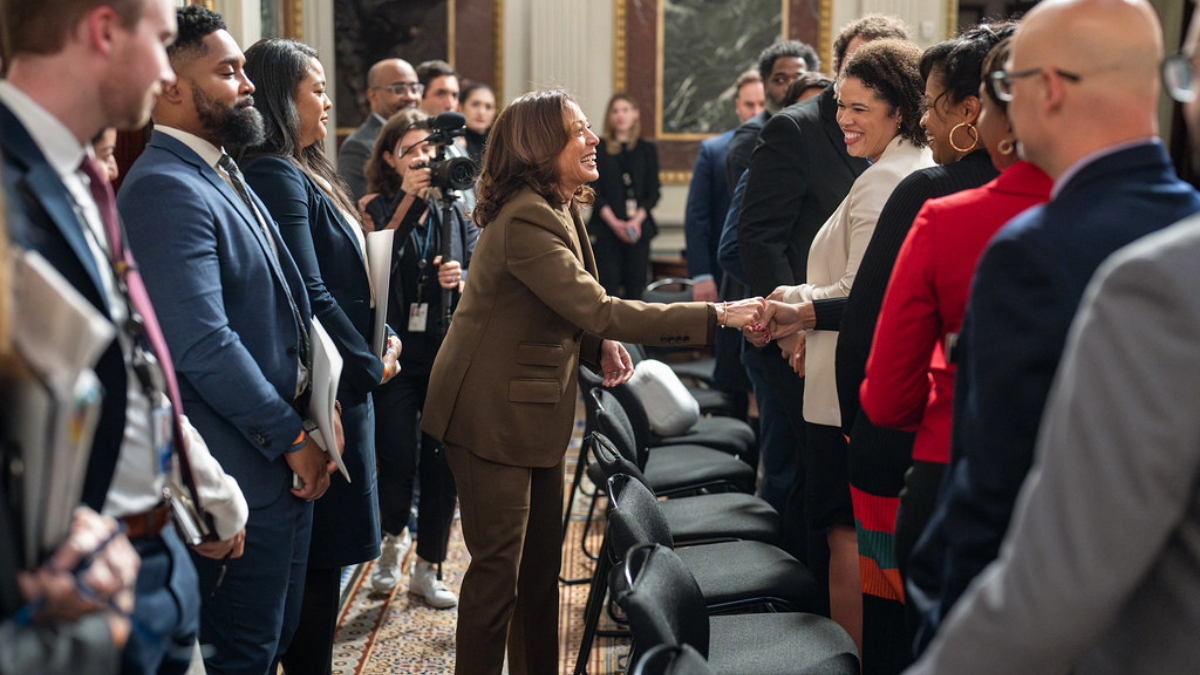The Surge of Gendered and Racial Attacks on Kamala Harris was Predictable. Social Media Platforms Still Aren’t Prepared
Prithvi Iyer / Jul 24, 2024
Vice President Kamala Harris greets attendees at a meeting on voting rights with civil rights leaders and activists, Tuesday, February 27, 2024, in the Indian Treaty Room of the Eisenhower Executive Office Building at the White House. (Official White House photo by Lawrence Jackson)
On Sunday, US President Joe Biden announced that he would not pursue a second term, reshaping the political landscape for the upcoming election. Key leaders of the Democratic Party swiftly rallied behind Vice President Kamala Harris, endorsing her as the presumptive nominee. Following the announcement, social media platforms like X were flooded with posts questioning Harris's candidacy and character and many more advancing false claims and conspiracy theories targeting her race, gender, and citizenship.
With mis- and disinformation about Harris now at a fevered pitch and likely to increase in the coming weeks, it is worth looking at recent research on the kinds of false claims that are likely to be employed on social media platforms to weaponize Harris’s identity as a Black woman candidate, especially for platform executives in charge of election integrity issues who seem to have been caught unprepared.
Indeed, the platforms will need to double their efforts if the last few days are any sign of what’s to come. Unsurprisingly, since President Biden’s endorsement of Harris, some posts shared widely have falsely claimed her success is solely due to past relationships with powerful men, with some even falsely linking her to Sean "Diddy" Combs, a hip-hop mogul who has been repeatedly accused of sexual harassment. Right-wing conspiracy theorist Laura Loomer went a step further and accused Harris of being an “escort” while also drawing attention to her past relationship with Willie Brown, the former Mayor of San Francisco. Along with misogynistic attacks, there have also been dubious claims regarding her racial identity. One widely shared post on X (formerly Twitter) incorrectly states, "Kamala Harris isn't black. She is Indian American. She pretends to be black as part of the delusional, Democrat DEI quota." Another post falsely asserts, "Kamala Harris is not eligible to run for President. Neither of her parents were natural born American citizens when she was born." According to the Associated Press, this post was liked “more than 34,000 times.” The pace at which such false claims about a presidential candidate can spread online is alarming, especially during an election year.
Looking at past research on this topic suggests these false claims fit a pattern. Researchers have extensively studied these types of misinformation attacks that target a candidate’s gender and racial identity. Similar attacks against Kamala Harris were rampant on social media after she was appointed as Vice President in 2020.
- During that cycle, communications scholars Dorothy Bland, Mia-Moory Ramirez, Gheni Platenburg, Mira Lowe, and Lawrence Mosely looked into how Harris was framed via memes during that election cycle and found that many memes targeting Harris used “racist and sexist characterizations that built on historical stereotypes of Black women,” framing her with tropes like “Jezebel” and “Tragic Mulatto.”
- Likewise, a similar study by Rebecca Coates Nee from San Diego State University that focused on the Twitter discourse related to Harris during the 2020 US election found that “gender frames previously used against other female candidates were present (inauthentic, ambitious), as well as racial frames leveled against Barack Obama (violent, dangerous, not Black enough).” However, what was unique to Harris was the prevalence of “oppressive stereotypes and controlling images related to her intersectionality as a Black woman (tough, angry, sexually promiscuous, and loser).”
- A 2021 report from the Wilson Center, authored by Nina Jankowicz, Jillian Hunchak, and Alexandra Pavliuc, explored the “direct and indirect impacts of gendered and sexualized disinformation on women in public life” by analyzing “online conversations about 13 female politicians across six social media platforms, totaling over 336,000 pieces of abusive content shared by over 190,000 users over a two-month period.” The findings revealed that such types of disinformation are widespread, with Kamala Harris accounting for an overwhelming 78% of recorded instances. Misinformation with sexualized and misogynistic undertones was the most common (31% of total data collected), while racist narratives were comparatively less common (0.8% of total data collected). However, the researchers note that online gendered abuse is “intersectional in nature, with abusers often engaging with both sex- and race-based narratives, compounding the threat for women of color.” Such attacks are particularly effective because of what the authors call “malign creativity,” which refers to the use of coded language and memes to avoid detection by social media platforms and is the “greatest obstacle to detecting and enforcing against online gendered abuse and disinformation.”
- A research paper authored by Dhanaraj Thakur, DeVan L. Hankerson, Michal Luria, Saiph Savage, Maria Rodriguez, and Miriam G. Valdovinos, and published by the Center for Democracy and Technology also looked at how online gender-based disinformation affected women candidates of color in the 2020 US election. The authors conducted a content analysis of over 100,000 Twitter posts targeting political candidates to compare levels and nature of misinformation based on candidate types. The study had some startling results:
- “Women of color candidates were twice as likely as other candidates to be targeted with or the subject of mis- and disinformation.”
- Women of color were the subject to more sexist online abuse compared to white women candidates.
- “Women of color candidates were at least five times more likely than other candidates to be targeted with tweets related to their identity that focused specifically on their gender and race.”
Effectively responding to online gendered misinformation requires cooperation and a willingness to act on the part of social media platforms. As recent research has shown, gendered misinformation often uses coded language to evade detection via automated content moderation algorithms, making it much harder for these platforms to enforce against such attacks. Here are a few actionable recommendations for platforms to deal with this important issue in a critical election year.
- Implement a comprehensive incident reporting system that allows users, especially women, to report multiple abusive posts simultaneously so that content moderators have a better understanding of the online harassment women face. (Wilson Center)
- Platform algorithms and keyword filters should be regularly updated to “root out malign creativity, improve automated detection methods, and introduce nudges or friction to discourage users from posting abusive content.” (Wilson Center)
- Establish a cross-platform consortium to “track and respond to online misogyny, similar to existing consortiums which counter terrorism and extremism.” (Wilson Center)
- Platforms should also invest in resources to “engage in the extra scrutiny of content that affects historically discriminated-against groups.” One possible way to facilitate this would be for platforms to track accounts spreading such content and “putting these accounts’ posts on a time delay for expedited review to ensure that content does not violate civic integrity standards.” (CITAP researchers)
While implementing these recommendations may take additional resources, it is important that, at the very least, social media platforms refrain from providing preferential treatment to either party. A recent article in the New Republic reported that X users had trouble accessing Kamala Harris’s official page. Whether this was a deliberate decision or just a technical glitch on X’s part is not clear. However, there are real fears about social media platforms being more sympathetic to the Trump campaign, and the fact that Elon Musk himself reshared the dubious post about Harris’s ties with Diddy shows that these fears are warranted. As we get closer to the election, such unsubstantiated misinformation attacks will only increase, and social media platforms must redouble their efforts to protect democratic discourse.
Authors
